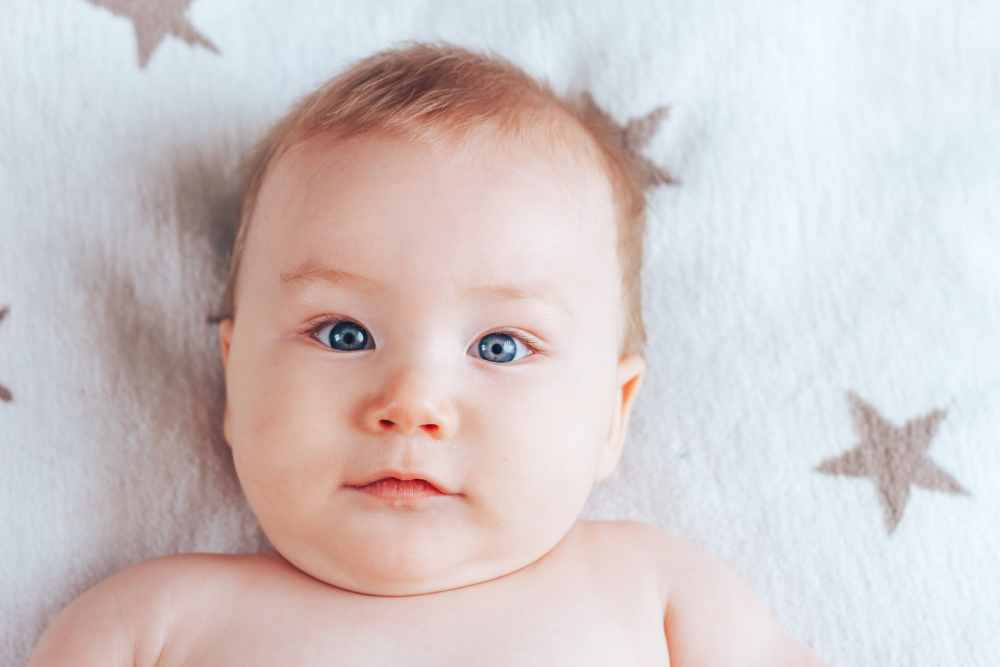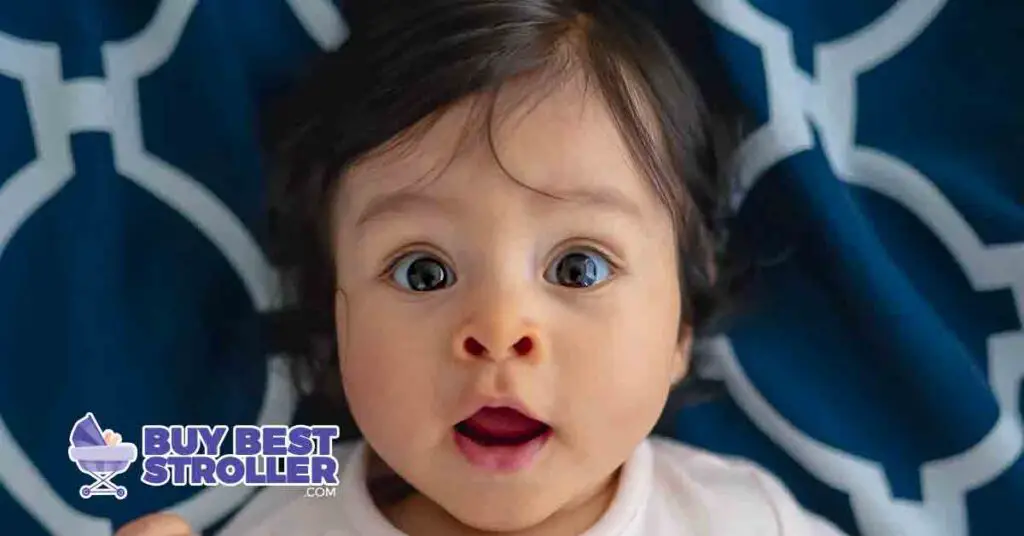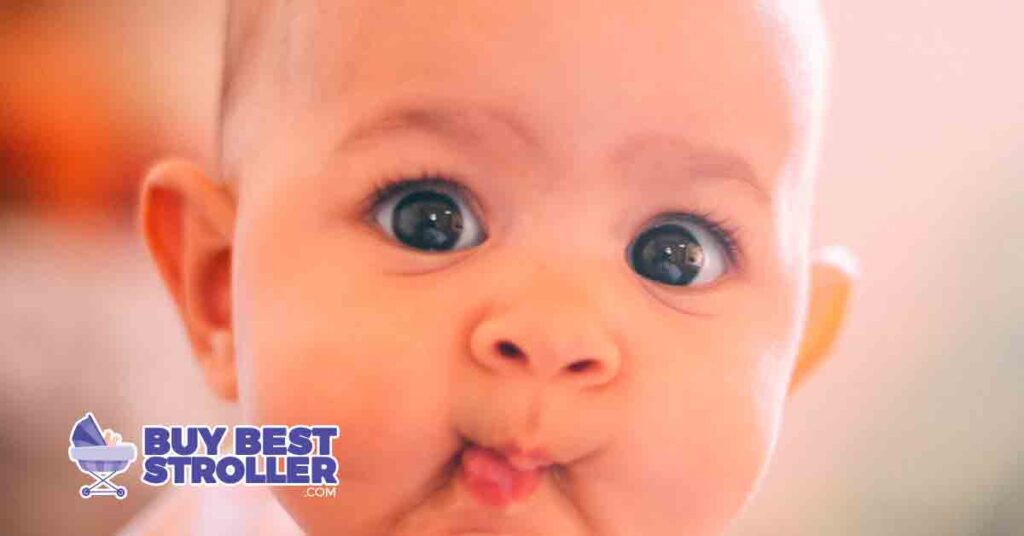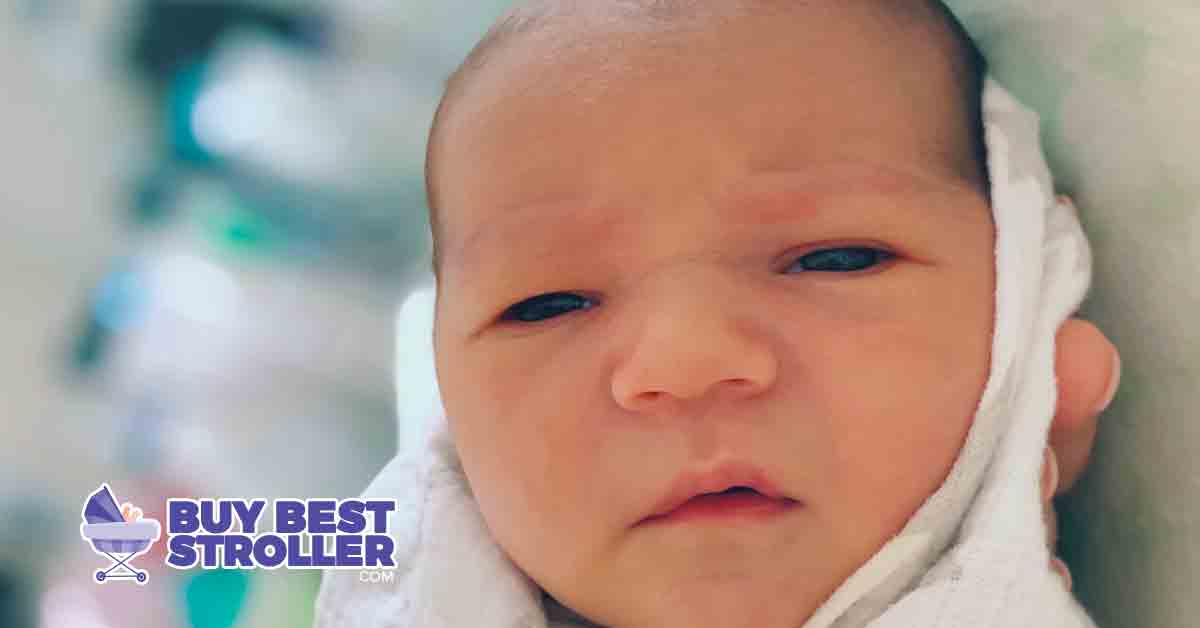When a guest comes to your house, your infant stares at him until he leaves. Is this something you’ve experienced before?
Infants and Babies of younger age tend to stare at ceilings often as their vision and ability to focus are generally developing.
- At a young age, babies are fascinated by the patterns and shapes they see on the ceiling, and they try to make sense of it.
- Babies also enjoy the sensation of looking up at the ceiling.
At least once in every new parent’s life, they have such an experience. It is possible that you too felt concerned at one point. You shouldn’t worry about it, though. You might have also seen your baby staring and smiling.
why do babies stare at the ceiling and smile?
A common characteristic of newborns and infants is their habit of staring at people, objects, and even the ceiling and walls. Baby’s vision is usually developing appropriately if this is the case, and they’re on the right developmental track.
Babies stare at the ceiling and smile because this is their part of the development and it is completely normal for them to stare at nothing and smile.
You don’t have to worry if your baby is fascinated by your ceiling fan. There is nothing wrong with this and, in fact, it can be very convenient for parents.
Babies enjoy watching ceiling fans for hours and may even fall asleep when they are watching them.
If older children stare at ceiling fans or other things like that, many experts believe that they might be on the autism spectrum.
It may be a good idea to stare at a ceiling fan if your baby is under 4 months old.
At this age, young babies may also smile at inanimate objects like ceiling fans, and this is not unusual.
Within four months of birth, you should not only see your baby smiling, but also hear him or her laughing or giggling.
Why Do Babies Stare At You?
It’s possible a baby thinks you are beautiful, which is why they’re staring at you.
This isn’t a joke! Researchers discovered that young infants and newborns spent a greater amount of time staring at faces they considered attractive than faces they did not.
This research consisted of images of (adult-selected) beautiful and unattractive faces.
The babies stared at the pictures of the “beautiful” faces longer than they did at the pictures of the ugly faces.

Why Do Babies Stare At Objects?
By the age of 3 months, babies are drawn to movement. Because of the movement in the objects, your baby may now start staring at them. During this phase, they are developing naturally.
Babies naturally find something new to see fascinating as their minds process what they are seeing and learn about it as much as they can.
According to Marnie Baker, babies appear sweet and simple, but their child’s brain is busy developing.
Why Do Babies Stare Into Space?
All the information that your baby learns about the world around them in developing their brains constantly.
A baby who stares at space is probably just absorbing everything in the world as they are absorbing all the information around them!
The reason your baby seems to be staring into nothing is that their little brains are processing all the new information they are absorbing.
During the first three months of your baby’s life, his or her brain will continue to grow rapidly, so when you think they are just staring out into nothing, they are actually working overtime to process the world around them.

Why Do Babies Cry With A Certain Person?
It is common to be afraid of strangers. During this stage of child development, it is normal.
The process occurs when your baby develops a strong bond with familiar people, such as you.
As babies prefer familiar adults, they might cry or fuss at strangers, go very quiet, show fear or hide when they see them.
At around seven to ten months of age, strangers become more frightening.
It can be temporary or last for a long time. Usually, it lasts for up to two years.
Why Do Babies Stare At Walls?
In newborns and infants, staring at walls or ceilings, people, or objects is quite common.
Baby’s vision is usually developing appropriately if this is the case, and they’re on the right developmental track.
Can Babies See Things We Can’t?
Despite their ability to see things that adults cannot, babies cannot tell us what they see.
The eyes of newborns, aged three to four months, have the ability to see subtle differences in pictures with a greater degree of detail than the eyes of grown adults.
This allows them to distinguish between colors and objects like grown adults will never be able to.

Can Babies See In The Dark?
The Eye Development of Your Baby. Light and dark can be discerned by babies even in the womb.
Birth is the time when they see shapes and follow the paths of light and darkness.
However, that happens only when they are several weeks old.
Why Don’t We Remember Being A Baby?
As children, we aren’t able to make stable memories of events, which is why we may not remember much of our childhood.
According to logic, if you don’t have a memory, you can’t access it! However, babies and small children are capable of forming memories.
Is It OK For A Baby To Look In The Mirror?
Mirrors make it easy for babies to explore their surroundings. The “baby” in the mirror will likely be reaching out for their touch.
It won’t take them long to begin to recognize their own reflection and learn to see it as themselves.
Take advantage of this opportunity to do some vocabulary development with your little one while in the mirror!

At What Age Do Babies Start Seeing Clearly?
Babies can usually focus on their parents’ faces by the time they are around 8 weeks of age.
Your baby’s eye should be following objects around 3 months old.
Observe your child’s eyes as they track a brightly colored toy and their hands reaching for it if you waggle the toy near them.
Is It Bad For Babies To Watch TV?
Even though watching TV is better than starving, not watching it is worse.
According to good evidence, children who are exposed to screens before the age of 18 months are more likely to develop language problems, reading difficulties, and short-term memory difficulties as they grow up.
It can also cause sleep problems and attention problems.
Obviously, children get more out of watching television or using apps when their parents are involved. It’s important to pay attention to content.
Although all programs teach something to the children, it’s best to choose those that consist of language and math instruction.
From ages 18 months to 5, limit your child’s exposure to electronic entertainment to an hour a day, regardless of content.

Why Do Babies Have A Reflex Smile?
A baby’s reflex smile means their muscles are working normally.
Babies experiment with a wide range of expressions during the first few weeks of life.
They learn to smile when they are happy and to imitate caregivers’ smiles as they build relationships with caregivers and form deeper social connections with them.
When a baby sleeps or goes to the bathroom, he or she may have a reflex smile.
The real smile occurs when we hear our parents or see our parents.
What Are The Early Signs Of Autism In Babies?
Autism spectrum disorder will appear differently in every infant and adult, but there are several key characteristics that may serve as cues.
1. Contact with the eyes is limited
Mothers may notice that their babies aren’t making eye contact while breastfeeding. Autism can affect a baby’s ability to smile or giggle.
Moreover, autistic kids are often fussier and more difficult to calm down than their neurotypical counterparts.
2. Physical disengagement from parents
Infants with autism may not be able to engage with their caregivers the way neurotypical babies do.
Children with autism might ignore movements such as waving and clapping, or they might not respond to cooing.
3. Sensory processing problems
Babies with autism are often distressed by fabrics (especially new ones) and bedding.
A toy that makes noise or has flashing lights can also make them overwhelmed.

In What Ways Can Autism Be Prevented?
Living a healthy lifestyle may not prevent getting an autistic child, but it can increase your odds. Make sure to get regular check-ups, eat a healthy diet, and exercise regularly.
Take the recommended vitamins and supplements and get good prenatal care.
The Bottom Line
During the first year of your baby’s life, you’ll notice a lot of changes in their personality.
Staring is one sign that a baby’s brain is hard at work in order to grow, as they observe everything around them.
Early in life, babies develop a variety of different skills.
When little ones stare, it may be that they are developing and growing their brain.
Whether it’s staring or any other behavior, we encourage you to consult your pediatrician if you’re concerned.




